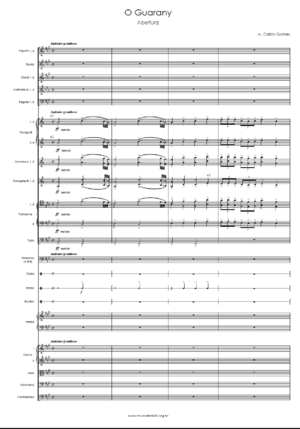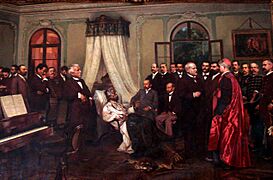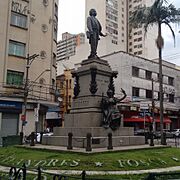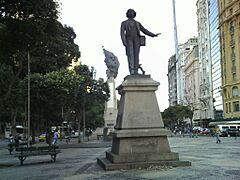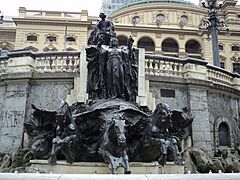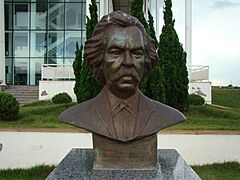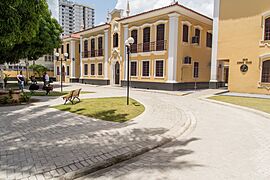Antônio Carlos Gomes facts for kids
Quick facts for kids
Antônio Carlos Gomes
|
|
|---|---|
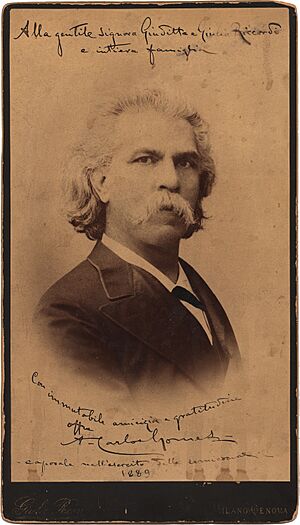
Gomes in 1889
|
|
| Born | 11 July 1836 |
| Died | 16 September 1896 (60 years) |
| Nationality | Brazilian |
| Occupation | Composer |
Antônio Carlos Gomes (born July 11, 1836, in Campinas – died September 16, 1896, in Belém) was a famous Brazilian composer. He was the first composer from the Americas whose music was widely accepted in Europe.
Gomes was especially successful in Italy. He became a well-known opera composer during a time when opera was very popular. This was when famous composers like Verdi and Puccini were also active. Carlos Gomes was the only non-European composer to achieve such success in Italian opera.
He became famous before Puccini started his career. After his opera Il Guarany was first performed, people saw Gomes as a very promising new composer. Even Verdi, a giant in opera, said Gomes's work showed "true musical genius."
Contents
Life of a Musical Genius
Antônio Carlos Gomes was born in Campinas, a city in São Paulo Province, Brazil. His father, Manuel José Gomes, was a music teacher, also known as a Maestro. His mother was Fabiana Maria Jaguari Cardoso.
Early Musical Journey
Carlos Gomes showed a talent for music from a young age. His father and older brother, José Pedro de Sant'Ana Gomes, encouraged him. José Pedro was a great help and guide in Carlos's music career. He convinced Carlos to visit the Court of the Emperor.
There, Carlos Gomes became a special student, or protégé, of Emperor Dom Pedro II. The Emperor was very interested in helping Brazilian artists. He made it possible for Carlos to study at the Musical Conservatory of Rio de Janeiro.
Studying in Italy
Carlos Gomes finished his studies with high honors. His first opera, A noite do castelo (The Night at the Castle), was performed in September 1861. It was a big hit! Two years later, his second opera, Joana de Flandres, was even better.
These successes convinced the Emperor to give him a special scholarship. This allowed Carlos to study in Italy in 1864. He went to the Milan Conservatory and studied with famous teachers like Lauro Rossi and Alberto Mazzucato. He finished a four-year course in just three years. He earned the title of Maestro Composer.
Il Guarany and Fame
Carlos Gomes wanted to write an opera about a truly Brazilian story. He chose the novel O Guarani by Brazilian writer José de Alencar. This story was about Indigenous people.
His opera, called Il Guarany, was first performed in May 1870. It opened at the famous La Scala Theater in Milan. It was a huge success! Music critics compared Gomes to great European composers like Rossini and Verdi.
The King of Italy, Victor Emmanuel II, honored Gomes for his work. Il Guarany was performed in major cities across Europe. Later that year, Gomes returned to Brazil. He arranged for Il Guarany to be performed in Rio de Janeiro, where it was also a great success.
Life After Success
After returning to Italy, Carlos Gomes married Adelina Peri. She was an Italian pianist he had met in Milan.
In 1876, he wrote a special song called Il saluto del Brasile (The Salute of Brazil). It was for the 100th birthday of American independence. This song was performed in Philadelphia.
In 1883, Gomes visited Brazil again. People honored him in every city he went to. When he returned to Italy, he started working on an opera about slavery. He was inspired by the fight to free black slaves in Brazil. This opera was called Lo schiavo (The Slave). A friend, André Rebouças, who was a black engineer, had suggested the idea. The opera was first performed several years later, in 1889.
Later Years and Legacy
In 1889, the Brazilian republic was formed. Carlos Gomes was in Campinas at the time. He was very loyal to the Brazilian monarchy and Emperor Dom Pedro II. Because of this, he refused to compose the new Brazilian National Anthem when asked by the president.
In the years that followed, he wrote another opera called Condor. He also composed a cantata (a piece for voices and instruments) called Colombo. This was for the Columbus Festival in 1892, celebrating 400 years since the discovery of America.
The governor of the Brazilian state of Pará invited Gomes to lead the Musical Conservatory there. Carlos Gomes traveled to Belém, the capital, to take the job. However, he was already an older man and not in good health. Soon after arriving, Carlos Gomes died on September 16, 1896.
Besides his eight operas, he also wrote many songs, choruses, and piano pieces.
Gallery
Many honors were given to conductor Carlos Gomes throughout Brazil and abroad where he ruled and made fame.
- Maestro Carlos Gomes
-
Statue of Carlos Gomes in Cinelândia, downtown Rio de Janeiro
-
Carlos Gomes State Institute Building, the conservatory that bears his name, in Belém.
Antônio Carlos Gomes's Operas
- See List of works for the stage by Antônio Carlos Gomes
See also
 In Spanish: Carlos Gomes (músico) para niños
In Spanish: Carlos Gomes (músico) para niños
 | George Robert Carruthers |
 | Patricia Bath |
 | Jan Ernst Matzeliger |
 | Alexander Miles |


